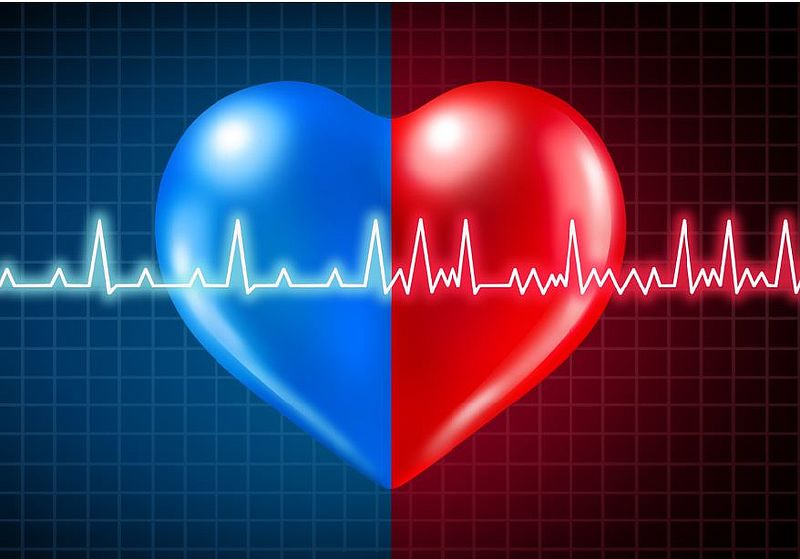The study found the effect in patients with persistent atrial fibrillation whose hearts were out of rhythm for more than a week or could only be brought back into rhythm by medical intervention. If they reduced their excess weight after catheter ablation, their atrial fibrillation returned less often than patients who did not lose weight. In patients with paroxysmal atrial fibrillation, where the heartbeat usually calms down on its own after a few hours or a few days, losing weight had no effect.
The study participants had a BMI between 30 and 40 and were randomly assigned to the group with or without a diet programme. This was a structured weight reduction programme, the so-called interdisciplinary multimodal step concept. It combines nutritional counselling, exercise, and psychosomatic care under medical supervision in specialised obesity departments. All patients suffered from the cardiac arrhythmia atrial fibrillation, which was to be eliminated by catheter ablation. In this procedure, doctors use a catheter to scar diseased areas in the heart muscle. Diet patients lost an average of five kilograms, lowering their BMI from 34.9 to 33.4. In the group without a diet, the participants did not lose weight.
A recorder under the skin as witness
After the procedure, the patients were followed for 12 months. To check how often atrial fibrillation recurred after the ablation, they were given a so-called event recorder under the skin. The USB stick-sized device was implanted through a small incision on the left side of the chest, and the patients were only locally anaesthetised. The event recorder was programmed so that it could record rhythm disturbances itself. Because sometimes these go unnoticed.
"The study participants found the device great because it gave them security, as it reliably documented their complaints. Many of them know the phenomenon that the heart stumbles at home, but as soon as they are at the doctor's, it beats evenly again, and then they fear not being taken seriously," says study leader Professor Stephan Willems from the Asklepios Klinik St. Georg in Hamburg. The scientists then evaluated the data recorded by the event recorder. They counted all rhythm disturbances that lasted longer than 30 seconds as atrial fibrillation.
More than just observation
"Our work is the first prospective, randomised study to systematically document how weight loss in obese patients affects their cardiac arrhythmias after catheter ablation," says first author Dr. Nele Geßler. In addition to the Hamburg hospitals Universitäres Herz- und Gefäßzentrum UKE Hamburg and Asklepios Klinik St. Georg, the University Heart Centre Lübeck and the University Hospital Cologne also participated in the study. The positive effect of overweight people losing weight was already known from several observational studies. In these, atrial fibrillation was treated differently, and the recurrence was only monitored with an ECG and, therefore, not as continuously.
A safe procedure, even if overweight
The SORT-AF study showed for all participants that catheter ablation is a safe procedure to treat their arrhythmias. There were no complications, such as bleeding in the space between the heart and the pericardium. Especially in overweight patients, doctors fear the risk of complications during catheter surgery. It also became clear that catheter ablations could be performed successfully in all patients because afterwards, there was significantly less atrial fibrillation in both study groups. "Although the patients with persistent atrial fibrillation benefited most from the structured diet programme, it is still important for all patients," says Geßler. "Because in addition to the benefit for atrial fibrillation, it helps reduce cardiovascular risks, such as heart attack."
Original paper: Supervised Obesity Reduction Trial for AF Ablation Patients: Results from the SORT-AF trial. Gessler N, Willems S, Steven D, Aberle J, Akbulak RO, Gosau N, Hoffmann BA, Meyer C, Sultan A, Tilz R, Vogler J, Wohlmuth P, Scholz S, Gunawardene MA, Eickholt C, Lüker J.Europace. 2021 Apr 25:euab122. DOI: 10.1093/europace/euab122.
Study title: Supervised Obesity Reduction Trial for AF Ablation Patients SORT-AF
Contact: Christine Vollgraf, Press and Public Relations, German Center for Cardiovascular Research (DZHK), Tel: +49 30 3465 529 02, presse(at)dzhk.de
Scientific contact: Professor Stephan Willems, Asklepios Klinik St. Georg, s.willems(at)asklepios.com


